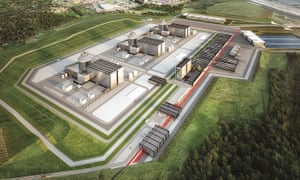
Photograph: NuGeneration Limited/PA
UK nuclear plans could be hit by Westinghouse financial crisis
Toshiba’s US subsidiary, which has technology in about half world’s reactors, expected to file for bankruptcy protection
A financial crisis at a major nuclear energy business is threatening to deal a blow to the UK’s atomic energy programme.
Toshiba’s US nuclear subsidiary Westinghouse Electric is believed to be on the brink of filing in the US for bankruptcy protection from creditors. A UK expert said the collapse would leave a considerable hole in Britain’s new nuclear ambitions as Toshiba is a key player behind plans for a new power station at Moorside in Cumbria.
Westinghouse is a behemoth in the world of nuclear vendors, with its technology in about half the world’s reactors. But it is facing a writedown of billions of dollars over its acquisition of a nuclear construction and services business. In 2015 Toshiba bought CB&I Stone & Webster, the company managing the construction of new reactors Plant Vogtle in Georgia and Virgil C Summer in South Carolina, both of which are over budget and behind schedule.
Westinghouse filing for Chapter 11 protection would potentially limit future losses for its owner Toshiba. The move will also trigger complex negotiations between the Japanese conglomerate, its American unit and creditors, and could embroil the US and Japanese governments, given the scale of the collapse and US government loan guarantees for new reactors.
The US utilities that operate the two nuclear plants are among Westinghouse’s biggest creditors, owed for work that has yet to be completed and potential penalties, sources have said. The bankruptcy filing will allow Westinghouse to renegotiate or break the construction contracts, although the utilities that own the projects would likely seek damages.
Credit rating agency Moody’s said it welcomed the prospect of bankruptcy because it could limit Toshiba’s liabilities.
Anti-nuclear campaigners said the episode showed the world should build renewable energy rather than new nuclear.
Doug Parr, policy director at Greenpeace UK, said: “The world is watching the meltdown of a major corporation and questioning the cost of new nuclear. Declaring bankruptcy in the USA might shield Toshiba from Westinghouse’s debt, but as Toshiba’s share price ricochets and its multibillion-dollar losses escalate, the beleaguered nuclear industry is being shaken to the core again.”
Dr Paul Dorfman, a nuclear expert at UCL in London, told the Guardian: “Toshiba has fallen on its sword and this has significant consequences for the UK’s plans for new nuclear. Kepco of South Korea may come and buy into NuGen [the consortium behind the UK’s Moorside plant]. But you can’t necessarily sell off the bad bits of a nuclear corporation and keep the good bits.”
Kecpo last week ruled out buying Westinghouse but said it was in talks to take a stake in NuGen. However, Dorfman said: “While Kepco may wish to buy into NuGen they may find it both legally and financially problematic.”
He added that any unravelling of Nugen as a result of Westinghouse filing for bankruptcy would “leave a considerable hole in UK nuclear plans”.
The AP1000 reactor design of the two US plants is the same as the three planned for the Moorside power station. Within days the UK nuclear regulator is expected to approve a “generic design assessment” for the AP1000, the end of a four-year approval process.
This year Toshiba has twice delayed publishing its financial results for the third quarter of 2016, which will reveal the scale of the impairment it faces with regards to CB&I Stone & Webster. In January, chief executive Satoshi Tsunakawa said that while Toshiba would continue to maintain and operate its existing nuclear plants: “It is unlikely that we will carry out construction work for future nuclear power plant projects, in order to eliminate risk.”
But NuGen has said that while Toshiba may not build Moorside, the Japanese corporation was still committed to developing the Moorside power station. The possibility of a Westinghouse bankruptcy also raises questions over its impact on the Springfields nuclear fuel plant in Lancashire. The company owns the site on a 150-year lease from the UK government’s Nuclear Decommissioning Authority.
In the US, the reactors that Westinghouse is building are due to be completed within the next three years.










